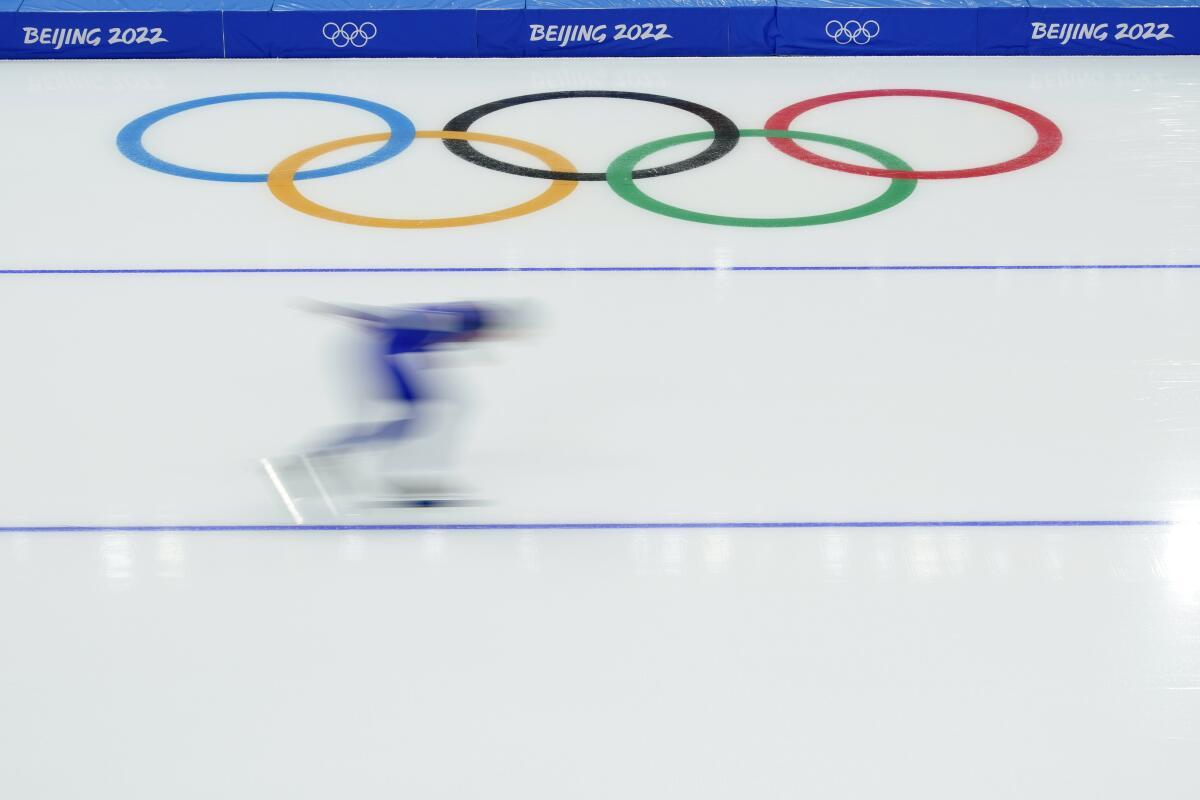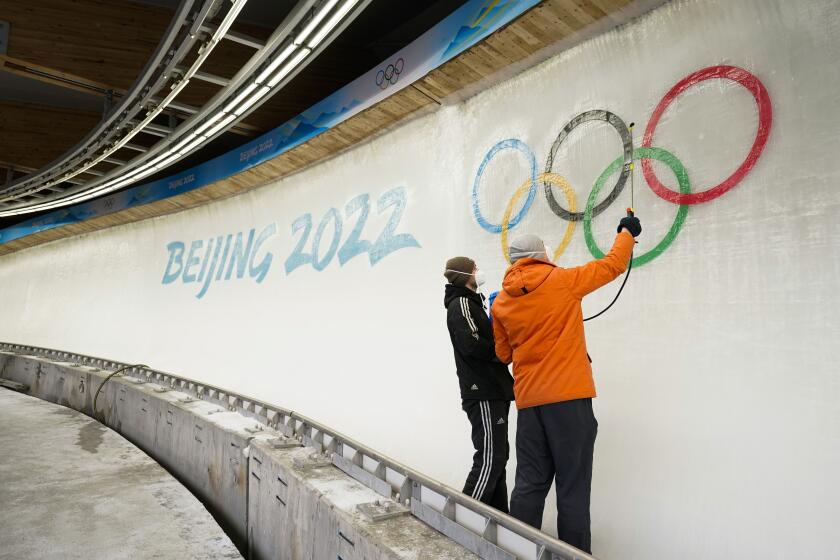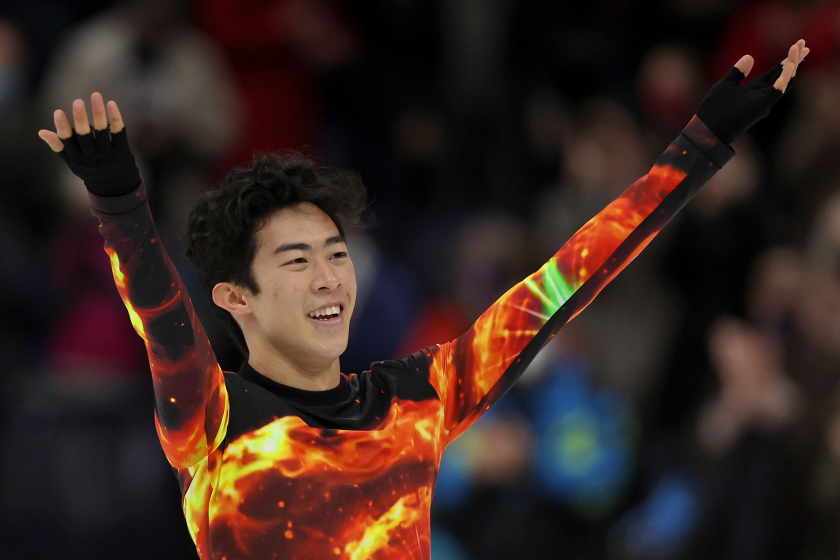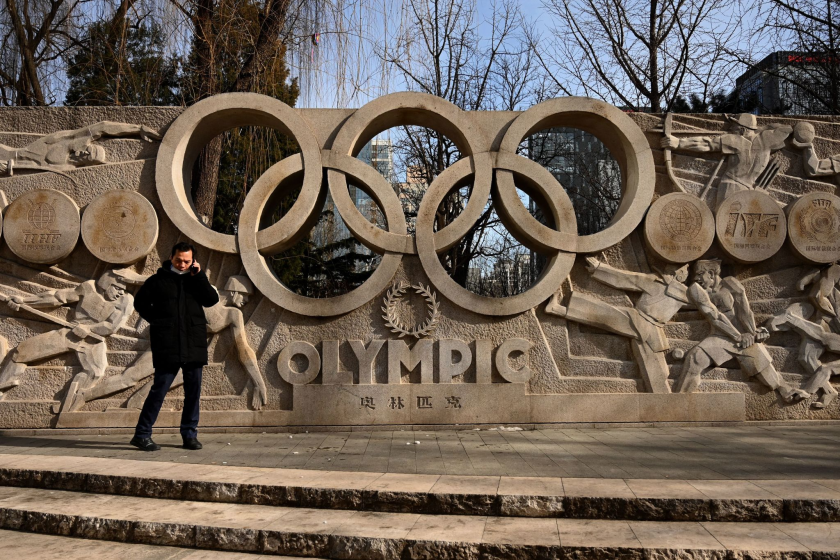Olympics lose their way through grotesque growth and small-minded leadership

- Share via
BEIJING — My introduction to the Olympics occurred in a quaint town in the Adirondack Mountains of upstate New York. You might have heard (or seen a movie) about the U.S. men’s hockey team pulling off a stunning upset at Lake Placid in 1980 and confirming the power of believing in miracles.
In the era before the internet or cellphones, Lake Placid was a charming but isolated place with a main street named — what else — Main Street. There were few ways to know the dramatic impact the hockey team was having on the outside world with its preliminary-round romp before its supposedly impossible win over the Soviet Union. The best gauge was the flood of telegrams fans sent from all over the world. Someone thought to post them on a wall at the main arena, and the telegrams crept up the wall to cover it like ivy.
The media center was set up at Lake Placid High School. Newsday, then my employer, was assigned an office in the high school science room. For all I knew it was standard practice for an Olympic office to be equipped with Bunsen burners and sinks. The news conferences, studiously shunned by U.S. hockey coach Herb Brooks, were held in the high school auditorium. On the speedskating track in front of the school, Eric Heiden sprinted and churned his way to five gold medals. In the longer races, some competitors would straggle to the finish line well after Heiden had won and departed.
A look at the different NBC platforms where you can find all the Winter Olympics sports and on what day.
Those memories came to mind this week after I was sprung from a two-day quarantine triggered by an inconclusive COVID test and freed to visit the Main Media Center for the Beijing Games. At 1,054,860 square feet, this chilly building designed to house 2,800 members of the media could easily swallow up Lake Placid High School. And most of the rest of Lake Placid, too.
My, how the Games have grown. And not always in a good way.
The Olympics were revived in 1896 by Frenchman Pierre de Coubertin, who was fascinated by the ancient Greek Games. He saw the modern Olympics as a path to mental and physical self-improvement as athletes pushed themselves to reach extraordinary heights. There was a lot of nobility in that. There still is.
Kendall Coyne Schofield has battled doubts and stereotypes in her Olympic hockey journey, and she wants to make the sport better for women.
Winning an Olympic gold medal — or simply making it to the Games — remains a powerful motivation for athletes to invest time and energy and sacrifice family life in pursuit of a goal that might bring little financial reward. Among winter athletes, some skiers, snowboarders and figure skaters have lucrative endorsements, but images of bobsledders and biathlon competitors seldom end up on cereal boxes. One of the few positive developments in recent decades is the increased participation of female athletes. But, while women’s hockey shines at the Olympics, there’s no immediate hope they’ll soon have a viable professional league in North America to keep them visible on a regular basis. They live on hope and competitiveness, for enrichment of the spirit.
As the Games expanded in scope and became absurdly overcommercialized, their purpose got twisted into a tool to enrich the crooked leaders of bid committees. Those leaders proclaimed that each Olympic city would benefit from upgrades to local transportation and sports facilities, but too often those stadiums, arenas, swimming pools and bobsled runs fell into disuse and fell apart. Ideals were trampled in the name of power and money.
After a nervous performance in the 2018 Olympics, U.S. figure skater Nathan Chen says he’s discovered how to experience joy in high-stakes competition.
Adding events and athletes meant that small but picturesque places such as Lake Placid or Lillehammer, Norway, could never host compact Games again. Future hosts had to be large cities or far-flung regions to accommodate additional venues and people. Something unique was lost when that happened. A Winter Olympics without natural snow seems to defy logic, but Beijing will be the third straight site where snow must be manufactured because the climate doesn’t naturally allow for it.
Munich, Germany, and Stockholm cited high costs when they were among the four European cities that dropped out of the bidding for the 2022 Winter Games. That left Beijing and Almaty, Kazakhstan, as finalists. Beijing won, sparking protests over China’s human rights record and authoritarian policies. Because Beijing had successfully hosted the 2008 Summer Games and vowed to reuse some of those venues to minimize construction bills, International Olympic Committee president Thomas Bach called its bid “really a safe choice.” That depends on what’s being safeguarded. In this case, it’s the interests of the IOC.
The Olympics have lost their way, and the Beijing Games are another step off the path.
Politics have once again have thrust themselves into the Olympics and athletes must walk the line between social protest and the right to compete.
These Games, which start Friday, have been overshadowed by fear that an athlete’s lifetime of work could be undone by a positive result from a mandatory daily throat swab. Team USA officials advised their athletes to leave their cellphones and computers at home and use disposable phones or rented laptops here to avoid losing personal information. Other countries gave similar advice to their athletes. That’s frightening.
Everything will take place within a “closed loop” designed to keep participants away from the public and keep COVID out of the Games. Those inside the loop can’t go sightseeing or visit restaurants. Families and fans weren’t allowed to travel here from overseas. These measures are harsher than the protocols that governed the year-delayed 2020 Tokyo Summer Games, but China is intent on maintaining a zero-COVID strategy and the IOC is going along with it. The show must go on because the IOC’s revenue flow must go on.
So, light the torch and declare the Games open and hope for the best amid bad circumstances. This would be a good time for IOC members to consider how far they’ve strayed from the joyous celebration that the Olympics should be. Growth isn’t necessarily bad, but selling your soul is.
More to Read
Go beyond the scoreboard
Get the latest on L.A.'s teams in the daily Sports Report newsletter.
You may occasionally receive promotional content from the Los Angeles Times.











